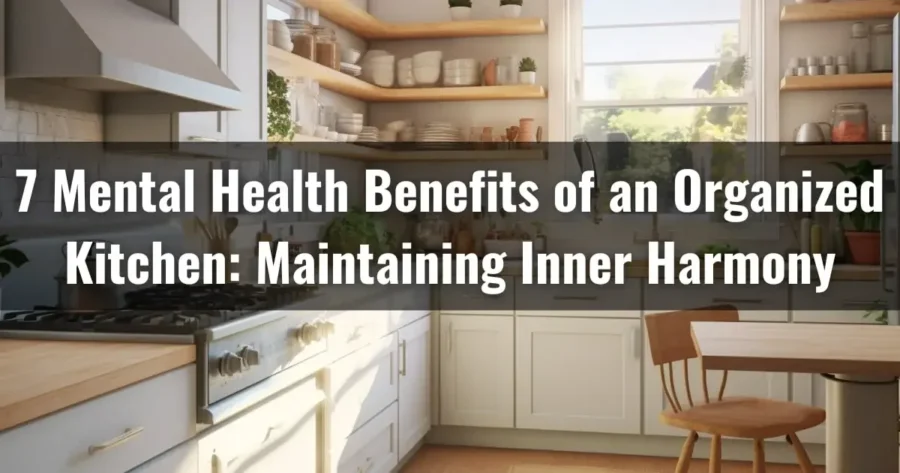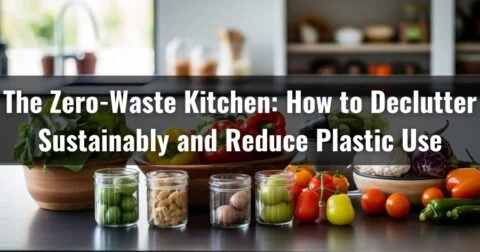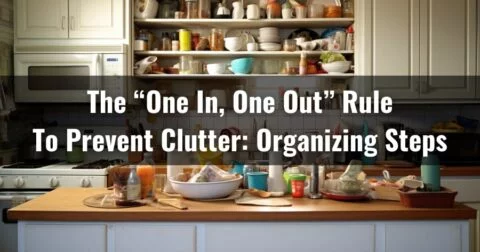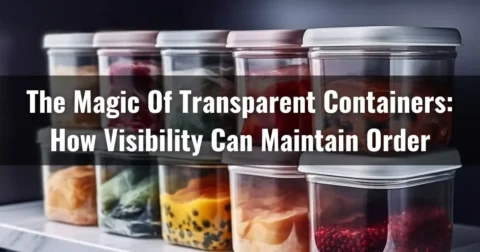Maintaining an organized home, especially a well-organized kitchen goes far beyond just a clean and tidy environment; it also profoundly impacts your mental well-being and prevents feeling overwhelmed.
When you maintain a systematic arrangement of your kitchen, you’ll be able to focus and concentrate better on work, from meal prep to household chores. An organized kitchen can also reduce your stress levels, which, in turn, improves your overall quality of life.
Thus, you need to make time to organize and declutter your kitchen on a regular basis. We will explore in detail the psychological benefits of an organized kitchen and provide some practical advice on organizing your kitchen effectively.
Jump to Section
Organized Kitchen, Organized Mind: The Psychology Behind a Clean and Tidy Space
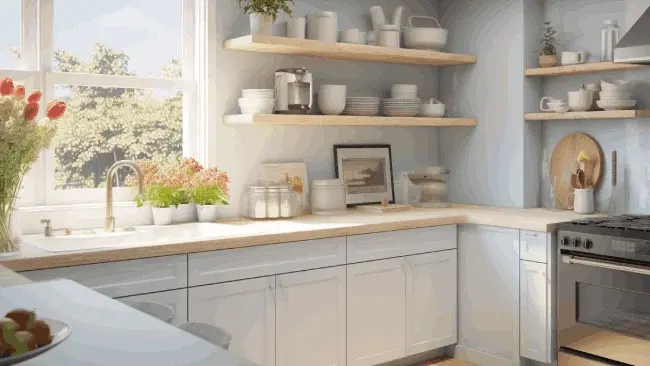
When your kitchen is organized, it can profoundly improve your mental state, including the following:
- Improve your focus and concentration
- Promotes creativity and inspiration
- Boost your energy levels
- Sense of accomplishment
- Harmony in family dynamics
- Reduce your stress and anxiety
- Improve your sleep quality
1. Improve Your Focus and Concentration
Maintaining an organized kitchen can significantly enhance your focus and concentration to work with greater efficiency and mental clarity. When your kitchen is free from clutter and well-arranged, fewer visual distractions can interrupt your thought process.
This reduction in visual chaos enables your brain to concentrate better on the task at hand. With a tidy space, your mind can process information more efficiently, improving cognitive performance.
2. Promotes Creativity and Inspiration
Maintaining an organized kitchen also improves your focus and concentration and promotes creativity and inspiration. When your kitchen is tidy, and everything is in its proper place, you’re more likely to feel inspired to try new recipes and experiment with different flavors.
The visually stimulating environment of an organized kitchen can spark your imagination and encourage innovative thinking. With utensils, ingredients, and tools readily accessible, you can explore new cooking techniques and create dishes that aren’t only delicious and visually appealing.
This enhanced creativity in the kitchen can extend beyond meal preparation and into other aspects of your life, fostering a more imaginative and inspired mindset overall.
3. Boost Your Energy Levels
Keeping your kitchen organized will help you maintain a constant level of energy. The order and cleanliness in your kitchen create a sense of calm and clarity, allowing you to navigate the space easily.
When everything is in its place, you save time and effort searching for items, reducing stress and frustration. This efficiency translates into increased productivity and a more energized mindset.
Also, cleaning and organizing itself releases endorphins, natural chemicals that uplift your mood and boost your energy.
4. Sense of Accomplishment
A well-organized kitchen gives you a sense of accomplishment that goes beyond the space, affecting your mindset and overall well-being.
Seeing the results of your efforts in the form of an orderly and tidy kitchen can boost your self-esteem and confidence. It serves as a reminder that you can take control and create order in your environment.
This sense of accomplishment can have a ripple effect, motivating you to tackle other areas of your life with the same determination and organization. With an organized kitchen, you feel capable and empowered, knowing that you have actively contributed to the harmony of your surroundings.
So, this positive mindset can translate into increased productivity and greater satisfaction in your daily life.
5. Harmony in Family Dynamics
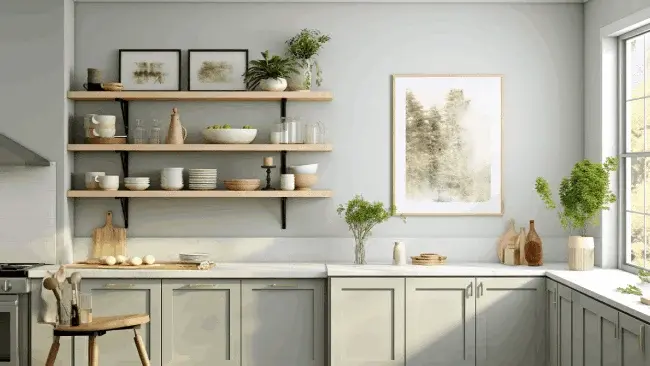
Maintaining a well-organized kitchen can contribute to fostering harmony within your family. When each family member is responsible for maintaining order in the kitchen, it creates a shared experience and a sense of togetherness. Collaborating in this way reduces potential sources of conflict and promotes positive interactions.
As family members work together to keep the kitchen organized, they develop a deeper understanding and appreciation for each other’s efforts. This extends beyond the boundaries of the kitchen, creating a harmonious atmosphere throughout the family.
The psychological benefits of a tidy kitchen are evident in the increased communication, cooperation, and overall well-being of the family.
6. Reduce Your Stress and Anxiety
Maintain an organized kitchen to reduce stress and anxiety, creating a calm and peaceful environment for your mind. A clutter-free space not only minimizes visual stressors but also contributes to a reduction in anxiety levels.
When everything is in its place, you feel a sense of control and order, alleviating the mental burden associated with chaotic environments. The streamlined kitchen allows you to navigate smoothly, promoting a sense of calmness and tranquility.
This stress reduction has a significant impact on your overall mental well-being. By organizing your kitchen, you create a sanctuary where you can escape the pressures of daily life and find solace in a tidy and harmonious space.
Take the time to declutter and organize your kitchen, and you’ll reap the benefits of reduced stress and anxiety.
7. Improve Your Sleep Quality
An organized kitchen promotes a sense of calm and order, which can directly impact your ability to sleep well.
When your kitchen is clean and tidy, it eliminates visual clutter and reduces mental stimulation, allowing your mind to relax and unwind. This relaxation can improve your sleep quality and contribute to a more restful night’s sleep.
Tips for Maintaining a Well-Organized Kitchen
To maintain a well-organized kitchen, you have to make organization a habit. Here are some guidelines to help you keep your kitchen tidy and clutter-free:
1. Declutter Your Kitchen Regularly
Regularly assess and declutter your kitchen to maintain a well-organized space and reap the mental benefits. Take the time to go through your cabinets, drawers, and countertops to identify items that are rarely used, broken, or redundant.
Use a systematic approach by categorizing items into ‘Keep,’ ‘Recycle,’ ‘Donate,’ or ‘Return to Proper Spot.’ This practice reduces visual clutter and ensures that your kitchen is equipped with only the essentials.
2. Organize Your Cabinets and Drawers
Thoughtful organization of cabinets and drawers is key to a functional kitchen. Consider your usage patterns and allocate specific areas for different items like tools, dishes, dishtowels, pots, and pans.
Place everyday items, such as utensils and dishes, near the dishwasher for easy access. Utilize drawer organizers, hooks, and vertical storage to maximize space and keep items neatly arranged. Balancing open and closed storage is important for both functionality and visual appeal.
3. Label and Date Your Items
Labeling and dating your items allows you to easily track your kitchen inventory and ensure that everything is organized and fresh.
Putting labels on your shelves, containers, and storage bins will make identifying and returning things easier. This prevents confusion and saves you time and effort when searching for specific ingredients.
Also, dating perishable items is crucial for preventing food wastage and ensuring you use them before expiration. When you can easily see the expiration dates, you can prioritize using those items, reducing the chance of them going bad.
This practice also helps you maintain a well-stocked kitchen with fresh ingredients, allowing you to prepare meals confidently.
4. Create Zones in Your Kitchen
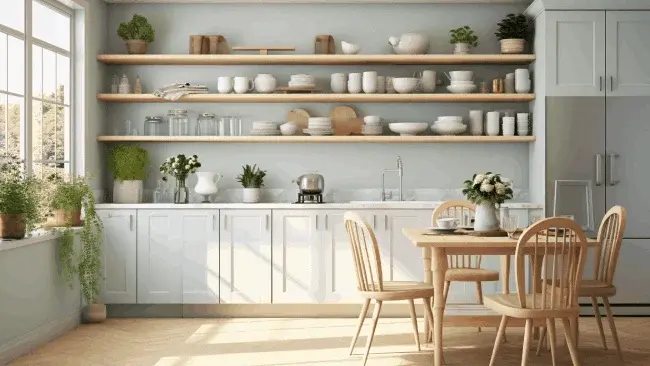
Creating distinct zones that optimize functionality and streamline your cooking process is imperative to ensure an efficient and well-organized kitchen.
Designate specific areas for different purposes, such as a coffee station or a baking zone. By assigning these zones, you can keep frequently used items within arm’s reach of relevant workstations, minimizing unnecessary movement during meal preparation.
This strategic zoning not only simplifies your workflow but also adds a level of organization that enhances the overall functionality of your kitchen. With everything in its proper place, you can navigate your kitchen, saving time and reducing stress easily.
5. Establish a Cleaning Routine for Your Kitchen
Set up a regular cleaning routine that ensures cleanliness and hygiene in your kitchen. Schedule deep-cleaning sessions to tackle all surfaces, including appliances, shelves, walls, and cabinets. Look out for drips and gunk that can accumulate over time.
Incorporate a daily or weekly cleaning checklist to address specific tasks and keep your kitchen hygienic and pleasant.
Start by wiping down countertops, sinks, and stovetops daily. Sweep or vacuum the floors regularly to remove dirt and crumbs. Try to clean your refrigerator, oven, and microwave every month.
FAQ’s: Mental Health Benefits of an Organized Kitchen
There are some common questions about organizing and maintaining a well-organized kitchen. Here are answers to some of the most frequently asked questions:
What are some signs that my kitchen needs decluttering?
There are a few signs to look out for that indicate it’s time to simplify and organize your kitchen space. One clear sign is if you have an excessive collection of kitchen tools that you rarely use.
Limited countertop space that hinders your cooking routine is another indicator that your kitchen needs decluttering. If you constantly struggle to locate frequently used items or are overwhelmed during cleaning sessions due to full cupboards, it’s time to reevaluate and declutter.
Difficulty directing others to kitchen items and a pantry or freezer overload are also signs that your kitchen needs organizing. Ultimately, if your kitchen feels too messy and it’s affecting your willingness to cook, it’s a strong indicator that a decluttering session is in order.
Can kitchen organization positively impact my nutrition and meal choices?
Organizing your kitchen can greatly enhance your nutrition and meal choices. When your kitchen is well-organized, it becomes easier to make healthier food choices.
With clear visibility of ingredients and a systematic arrangement of utensils, you can easily locate staples and plan your meals more efficiently. This reduces the temptation to opt for less nutritious options.
An organized pantry promotes a more mindful and intentional approach to cooking. It encourages you to incorporate various fresh and wholesome ingredients into your meals.
Organizing your kitchen contributes to a healthier and more balanced lifestyle by creating an environment that supports your nutritional goals.
Conclusion
Maintaining an organized kitchen is not merely about cleanliness; it’s a transformative practice that positively influences your mental well-being.
The psychological benefits, from improved focus and creativity to reduced stress and enhanced family harmony, underscore the necessity of organizing. Try to declutter regularly, create designated zones, and establish a cleaning routine for a streamlined and efficient kitchen.
As you walk through your well-organized kitchen, relish the sense of accomplishment and the positive impact on your daily life. Enjoy the peace and tranquility, for in the harmony of your kitchen, you find a sanctuary that nurtures both your mind and your culinary creativity.


